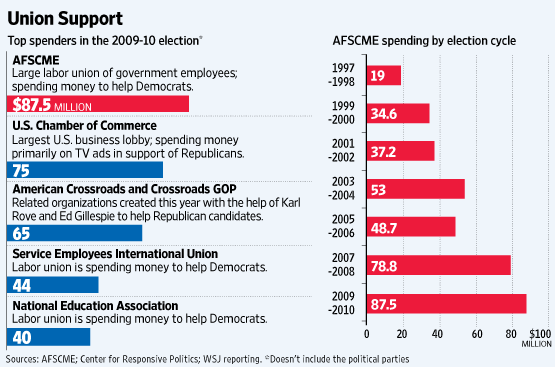Comfort Food
Banned
- Joined
- Jun 9, 2012
- Messages
- 232
- Reaction score
- 45
- Gender
- Undisclosed
- Political Leaning
- Undisclosed
I won't down play education, but pointing to education doesn't excuse us ignoring other problems. Unions have no more voice than business. Union voters have no more voice than non union voters.
While in principle this is true, in practice it is often not the case. The unions have rigged the system in their favor and they know how to exploit it. I'll explain:
1. Most school districts have a compulsory public union that teachers must belong to. And if they choose to "opt-out" they still have to pay over 90% of their union dues anyway. This funds the massive union bankroll.
2. Teacher's unions promote the concept of hiring local teachers who live or come from within the community. This is done on purpose. The reason for it is that teachers vote. And teachers who either live in or grew up in the district likely have friends and family who they attempt to influence to vote.
3. In almost every school district the education elections and votes are done during the week, at the schools, polls close early, and there is never any other vote other than education issues at the same time. This done by design and is 100% intentional. They would never want the public to vote for the school board the same day they vote for the mayor. This would make it too convenient for the general public to vote, which is what they try to limit. By setting the system up this way there is a much greater percentage of votes from district employees/families/friends to non-affiliated general public voters. These elections are often close. They would have a much lesser chance of receiving the result they wanted if they made it convenient for the public to vote, so they hold an election/vote on their own special day.
4. Private citizens who run for the school board do not have funding. The people who get the most exposure are the people who have been hand selected by the teacher's union to run. These are often retired teachers, principals or politically active people who are sympathetic to the union. They then use their union dues to put signs up around town and advertise the members they want. They also instruct all teachers on how to vote. Almost all of them will vote rank in file. The few general public voters who do show up to vote often show up only for the up/down vote on the budget. They don't know anything about the people running for the school board, but are more likely to vote for the people whose names are familiar. This gets union cronies elected to the school board. They don't need 100% of the seats, just a majority. This gives them the power to vote the way the want and nominate the board President.
5. School boards hire superintendents which has a major impact on negotiations and their influence over the district.
6. Teacher's unions then collectively bargain against/with a school board they elected and tax payers suffer.
Many school districts in America are in this cycle right now. What we're seeing is the public may not understand the strategy the union is using, but they know they are being screwed, they just can't put their finger on how. They are beginning to vote in their own members to the school board kicking out the union cronies. And in many places in America the new school board is downright hostile towards the unions. If you look at places where property taxes have gone up the most over the past decade you'll find where this pattern is in greater effect. This creates an us vs them scenario between the public and their public schools/teachers/officials.
Last edited:


